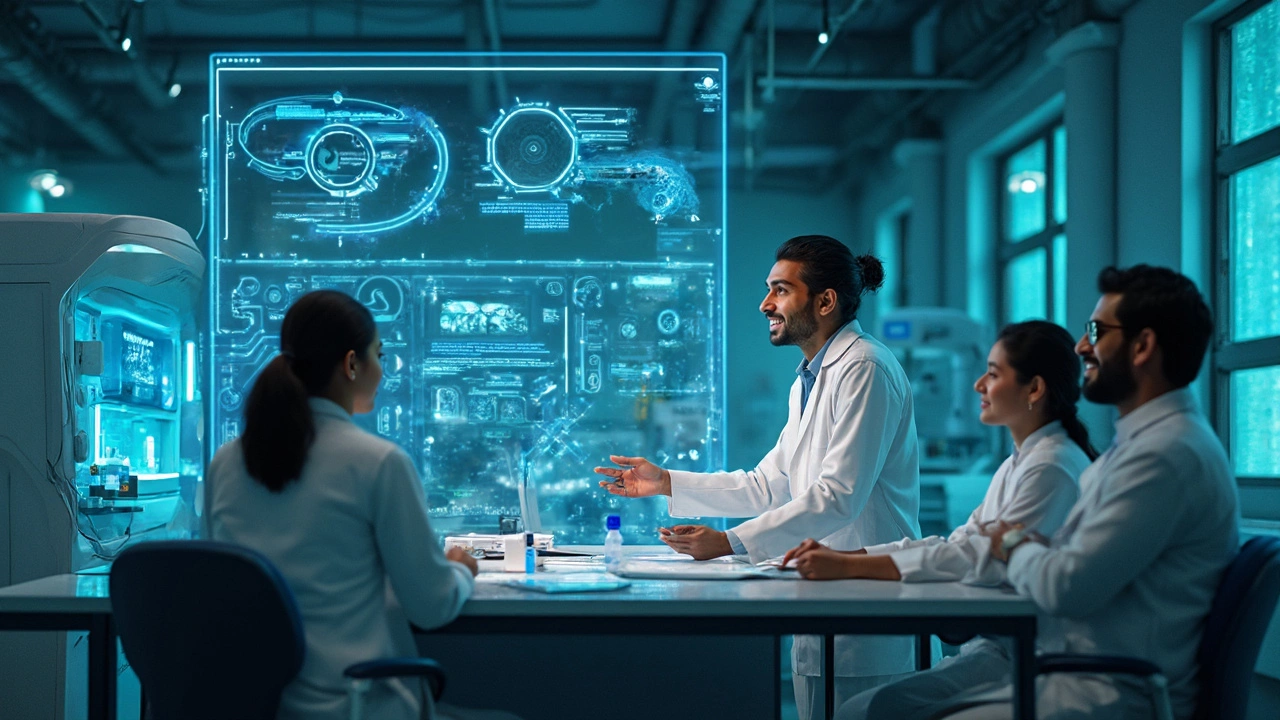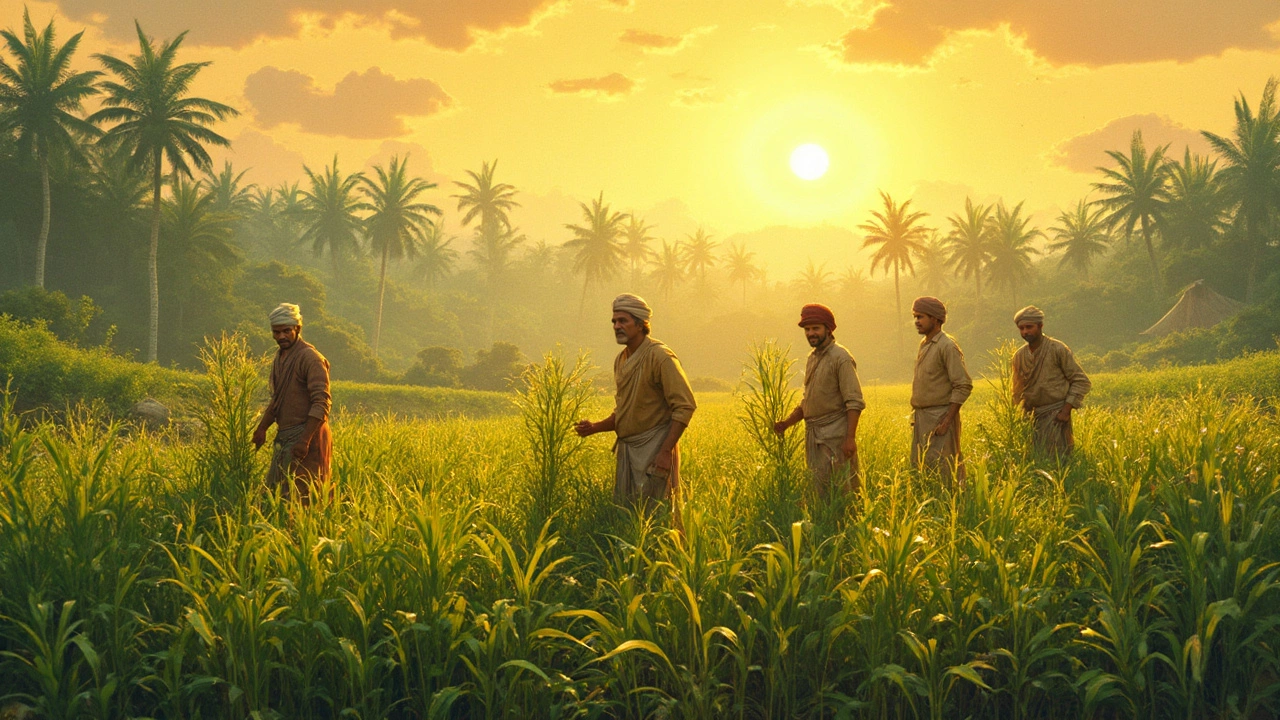Ever wonder how biotechnology is reshaping our world? It’s pretty fascinating! Picture this: scientists are using the very building blocks of life to tackle big, complex problems. From boosting food production to fighting diseases, biotech is like the superhero of science.
Let’s talk about genetically modified crops. These aren't just lab experiments; they're actually helping farmers grow more food with fewer resources. Imagine crops that can thrive in droughts or resist pests without using tons of pesticides. It’s a game-changer for food security, especially with a growing global population.
- The Rise of Genetically Modified Crops
- Personalized Medicine and Targeted Therapies
- Breakthroughs in Disease Detection
- The Role of Biotech in Sustainable Agriculture
- Environmental Biotech Solutions
- Ethical Considerations in Biotechnology
The Rise of Genetically Modified Crops
Genetically modified crops, often called GMOs, have become a cornerstone of modern agriculture. These crops are not just lab wonders; they're practical solutions to some pressing agricultural challenges. By tweaking genes, scientists have created plants that can resist pests, tolerate herbicides, and withstand harsh weather conditions like droughts. This means more reliable harvests no matter what Mother Nature throws at us.
So, why did we start tweaking these genes in the first place? It started as a way to boost production and combat food scarcity. Imagine a cornfield that doesn’t get wiped out by insects every season. Thanks to biotechnology advancements, farmers can rely on better yields with less chemical intervention. This is great news for the environment too—it means fewer pesticides and less soil degradation.
Let's get into the numbers. Currently, more than 70 countries have approved the cultivation and use of GMO crops. In the United States alone, genetically modified corn and soybeans make up a major chunk of the agricultural landscape.
| Crop | % Genetically Modified in the US |
|---|---|
| Corn | 92% |
| Soybeans | 94% |
It's not just about making plants tougher, though. There's a nutritional side, too. Some GMOs are designed to improve the nutrient content of foods, like adding vitamin A to
Personalized Medicine and Targeted Therapies
Ever heard of medicine being tailored just for you? That's what personalized medicine is all about! Instead of the one-size-fits-all approach, doctors can now look at your genetic makeup to decide the best treatment. It’s like getting a custom-fit suit instead of one off the rack — way more precise.
This shift is happening because of breakthroughs in genomics, the study of our genes. With these advances, medical experts can predict how you might respond to a certain drug or the risk of side effects. So, you get treatments that are specifically effective for you, especially handy for complex health issues like cancer.
Targeted therapies are another biotech marvel. Unlike traditional methods that affect both sick and healthy cells, targeted treatments aim just at the cancer cells, minimizing collateral damage. This means fewer side effects and often better outcomes. Pretty amazing, right?
Let's look at some numbers. For certain types of breast cancer, targeted therapies have cut the five-year survival rate by up to half. It's a big deal because it means real hope for countless people.
Here’s how it works in practice. If someone is diagnosed with a type of cancer, a doctor might run genomic tests to understand the cancer's specific traits. Based on those results, they choose a medication that targets those unique features of the cancer cells. This personalized approach can make treatments more effective and less harmful.
The exciting part? These biotechnology advancements aren't limited to just cancer. Researchers are expanding personalized medicine into autoimmune diseases, genetic disorders, and even mental health. The future looks promising, with more precise and effective care for everyone.
Breakthroughs in Disease Detection
Biotechnology is rocking the world of disease detection, making it faster and more accurate than ever. Think about how crucial early detection is for treating diseases like cancer. Thanks to biotechnology advancements, new tools are letting doctors catch these conditions early when they're easier to treat.
One of the coolest innovations is the use of biosensors – tiny devices capable of detecting minute biological changes. These little gadgets have the power to pick up on disease markers in blood or saliva, allowing for non-invasive and quick diagnostics. Suddenly, something that seemed like science fiction isn't so far-fetched anymore!
And let’s not forget about genomics and the rise of personalized medicine. By understanding a person’s unique genetic makeup, doctors can now detect the risk of certain diseases early and tailor treatments accordingly. This way, interventions can be far more effective and less generic.
Some successes in this realm include liquid biopsies. These tests analyze small fragments of DNA from tumors circulating in the blood, offering a less invasive alternative to traditional biopsies. This approach not only saves time and reduces patient stress but also helps monitor the effectiveness of cancer treatments in real-time.
Got curious about some stats? Check this out:
| Technology | Application | Benefits |
|---|---|---|
| Biosensors | Point-of-care testing | Quick results, less invasive |
| Liquid Biopsies | Cancer detection | Early detection, tracking treatment progress |
These technologies aren't just theoretical—they're actively being used and improved. With each passing year, biotech innovations are making disease detection more precise and accessible, making a healthier world seem a lot more achievable.

The Role of Biotech in Sustainable Agriculture
Biotechnology is working some real magic in agriculture, and it's all about making farming more sustainable. Imagine using science not just to grow more crops, but to do it in a way that's kinder to the planet. Pretty cool, right?
Here's how it works: One of the big wins is developing genetically modified crops. These are plants that have been tweaked to resist pests, reduce the need for chemical pesticides, and survive harsh weather conditions. For example, Bt cotton has been engineered with a gene from a bacterium that naturally fights off certain pests. This means fewer pesticides are needed, which is healthier for the soil and the surrounding environment.
But it’s not just about pest resistance. Biotech advancements have led to crops that use water more efficiently. Drought-tolerant corn is one example, helping farmers in arid regions produce reliable yields despite unpredictable weather. This kind of resilience is crucial as we're grappling with climate change. Plus, when plants use water more efficiently, there's less runoff, which can carry fertilizers and pollutants into waterways. Everybody wins!
That's not all. Scientists are working on biofortification – enhancing crops to boost their nutritional value. Golden rice, for instance, has been enriched with vitamin A, potentially reducing deficiencies in parts of the world where rice is a staple food.
With all this, biotechnology advancements aren't just about keeping our plates full. They're also about making sure the future of farming is sustainable and responsible. It's like setting the groundwork for a healthier planet while ensuring everyone has enough to eat. Isn’t that something?
Environmental Biotech Solutions
Ever thought about how biotechnology could save the planet? It's doing a lot more than you might think. One of the big stars here is bioremediation. What's that, you ask? It's like nature's own recycling system, using microbes to clean up pollution. Imagine little bacteria munching away on oil spills or breaking down harmful chemicals in soil and water. It's pretty cool and super helpful.
And it doesn't stop there. Biofuels are another fantastic biotech innovation. These are fuels made from renewable biological resources, like plant materials and animal waste. They're way better for the environment compared to traditional fossil fuels because they produce fewer greenhouse gases. We're talking about reducing your carbon footprint while still keeping your car running—win-win!
- Algae Biofuel: These little green guys pack a punch. Algae can be cultivated in water and even fed on waste, making them a sustainable option for producing biofuel.
- Switchgrass and Miscanthus: These non-food crops grow fast and don’t need much water or fertilizer. They’re being used more and more to produce ethanol, a cleaner fuel alternative.
Another remarkable achievement is in water treatment. Biotechnology is helping develop systems that use bacteria to treat wastewater, making it safe enough to return to the environment or even reuse. Think of it as turning yucky water into drinkable quality using nature's toolkit.
All these advancements in biotechnology aren’t just helping the environment. They’re setting up a future where we can live more sustainably and still enjoy the comforts of modern life. So next time you hear about a biotech breakthrough, remember it might be paving the way for a cleaner and greener planet!
Ethical Considerations in Biotechnology
Biotechnology is amazing and all, but let's not forget about the ethical stuff that comes with it. With great power, like altering the genes of living things, comes great responsibility, right? There's a lot of chatter about whether we're playing 'God' by tinkering with nature. It's a huge topic, and people have pretty strong opinions.
One biggie is the debate around genetically modified crops. Sure, these crops can help feed more people, especially in places where food is short, but what about the long-term effects on biodiversity? There's a genuine concern about how these super-crops might impact other plants or even the insects and animals that rely on them.
And then there's personalized medicine. Tailoring treatments to individual genetic profiles sounds like sci-fi, but it's reality now. However, questions pop up about genetic privacy. Who gets to see your genetic data? Insurance companies? Employers? The ethical implications of who owns and can access this sensitive information is still a hot topic.
Animal testing, too—biotechnology still relies a lot on animals for research. While biotech firms are finding alternatives, it raises the issue of animal welfare. How much should we prioritize human benefits over animal rights?
Some folks also worry about environmental impacts. While biotechnology advancements aim to solve environmental issues, like pollution, we need to make sure these solutions don't create new problems. Keeping the environment safe and healthy is key.
- Potential for Designer Babies: Gene editing in humans brings up the idea of designer babies. Parents choosing traits could mess with natural diversity and social equality.
- Bioweapons: The same tech used for good can be used for not-so-good, like creating harmful biological weapons. A global regulatory framework is crucial.
It boils down to finding a balance. Biotech holds incredible promise, but it also requires careful consideration of the ethical landscapes. Constant dialogue between scientists, ethicists, policymakers, and the public will help navigate these waters responsibly.





